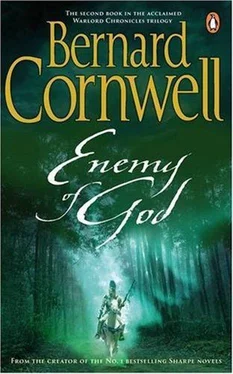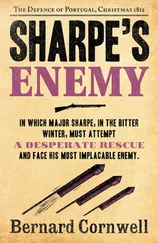Two seats remained, but before either was filled Cuneglas stood and rapped the table with his fist. Silence fell, and in the silence Cuneglas mutely gestured towards the treasures that were arrayed on the edge of the dais in front of the linen hanging from the table.
The treasures were the gifts Lancelot had brought for Ceinwyn and their magnificence caused a storm of acclamation in the hall. We had all inspected the gifts and I had listened sourly as men extolled the King of Benoic’s generosity. There were torques of gold, torques of silver and torques made of a mixture of gold and silver, so many torques that they merely served as the foundation on which the greater gifts were piled. There were Roman hand mirrors, flasks of Roman glass and piles of Roman jewels. There were necklaces, brooches, ewers, pins and clasps. There was a king’s ransom in glittering metal, in enamel, coral and precious gems and all of it, I knew, had been rescued from burning Ynys Trebes when Lancelot, disdaining to carry his sword against the rampaging Franks, had fled on the first ship to escape the city’s slaughter.
The applause for the gifts was still sounding when Lancelot arrived in his glory. Like Arthur he was dressed in black, but Lancelot’s black clothes were hemmed by strips of rare gold cloth. His black hair had been oiled and sleeked back so that it lay close to his narrow skull and flat against his back. The fingers of his right hand glittered with rings of gold while his left was dull with warrior rings, none of which, I sourly assumed, he had earned in battle. Around his neck he wore a heavy gold torque with finials glinting with bright stones, and on his breast, in Ceinwyn’s honour, he wore her royal family’s symbol of the spread-winged eagle. He wore no weapons, for no man was allowed to bring a blade into a King’s hall, but he wore the enamelled sword belt that had been a gift from Arthur. He acknowledged the cheers with a raised hand, kissed his mother on the cheek, kissed Guinevere on the hand, bowed to Helledd, then sat.
The one chair remained empty. A harpist had begun to play, her plangent notes scarcely audible above the buzz of talk. The smell of roasting meat wafted into the hall, where slave girls carried round the jugs of mead. Iorweth the Druid bustled up and down the hall making a corridor between the men seated on the rush-strewn floor. He pushed men aside, bowed to the King when the corridor was made, then gestured with his staff for silence.
A great cheer erupted from the crowd outside.
The guests of honour had entered the hall from the rear, stepping straight from the night’s shadows onto the dais, but Ceinwyn would make her entrance through the large door at the front of the hall and to reach that door she had to walk through the throng of guests waiting in the tire-lit compound. The cheer we heard was the sound of those guests applauding her progress from the women’s hall, while inside the King’s hall we waited for her in expectant silence. Even the harpist lifted her ringers from the strings to watch the door.
A child entered first. It was a small girl dressed in white linen who walked backwards up the aisle made by Iorweth for Ceinwyn’s passage. The child strewed dried petals of spring flowers on the newly laid rushes. No one spoke. Every eye was fixed on the door except for mine, for I was watching the dais. Lancelot gazed at the door, a half smile on his face. Cuneglas kept cuffing tears from his eyes, so great was his happiness. Arthur, the maker of peace, beamed. Guinevere alone was not smiling. She just looked triumphant. She had once been scorned in this hall and now she was disposing of its daughter in marriage.
I watched Guinevere as, with my right hand, I took the bone from my pouch. The rib felt smooth in my grasp and Issa, standing behind me with my shield, must have wondered what significance that piece of kitchen waste carried in this moon-bright night of gold and fire.
I looked at the hall’s great door just as Ceinwyn appeared and, in the instant before the cheers began in the hall, there was a gasp of astonishment. Not all the gold in Britain, not all the Queens of old, could have outshone Ceinwyn that night. I did not even need to look at Guinevere to know that she had been utterly outwitted on this night of beauty.
This, I knew, was Ceinwyn’s fourth betrothal feast. She had come here once for Arthur, but he had broken that oath under the spell of Guinevere’s love, and afterwards Ceinwyn had been betrothed to a Prince from distant Rheged, but he had died of a fever before they could marry; then, not long ago, she had carried the betrothal halter to Gundleus of Siluria, but he had died screaming under Nimue’s cruel hands, and now, for the fourth time, Ceinwyn carried the halter to a man. Lancelot had given her a hoard of gold, but custom demanded that she return to him the gift of a common ox halter as a symbol that from this day on she would submit to his authority.
Lancelot stood as she entered and the half smile spread into a look of joy, and no wonder, for her beauty was dazzling. At her other betrothals, as befitted a Princess, Ceinwyn had come in jewels and silver, in gold and finery, but this night she wore only a simple bone-white gown that was belted with a pale blue cord that hung by the dress’s simple skirt to end in tassels. No silver decked her hair, no gold showed at her throat, she wore no precious jewels anywhere, just the linen dress and, about her pale blonde hair, a delicate blue wreath made from the last dog-violets of summer. She wore no shoes, but stepped barefoot among the petals. She displayed no sign of royalty or any symbol of wealth, but had just come to the hall dressed as simply as any peasant girl, and it was a triumph. No wonder men gasped, and no wonder they cheered as she paced slow and shy-between the guests. Cuneglas was weeping for happiness, Arthur led the applause, Lancelot smoothed his oiled hair and his mother beamed her approval. For a moment Guinevere’s face was unreadable, but then she smiled, and it was a smile of pure triumph. She might have been outshone by Ceinwyn’s beauty, but this night was still Guinevere’s night and she was seeing her old rival being consigned to a marriage of her own devising. I saw that smirk of triumph on Guinevere’s face and maybe it was her gloating satisfaction that made up my mind. Or maybe it was my hatred for Lancelot, or my love for Ceinwyn, or maybe Merlin was right and the Gods do love chaos for, in a sudden surge of anger, I gripped the bone in both my hands. I did not think of the consequences of Merlin’s magic, of his hatred for the Christians or the risk that we would all die pursuing the Cauldron in Diwrnach’s realm. I did not think of Arthur’s careful order, I was only aware that Ceinwyn was being given to a man I hated. I, like the other guests on the floor, was standing and watching Ceinwyn between the heads of the warriors. She had reached the great central oak pillar of the high hall where she was surrounded and besieged by the wolfish din of cheers and whistles. I alone was silent on the floor. I watched her and I placed my two thumbs at the centre of the rib and gripped its ends between my fists. Now, Merlin, I thought, now, you old rogue, let me see your magic now.
I snapped the rib. The noise of its splintering was lost among the cheers. I pushed the rib’s broken halves into the pouch, and I swear my heart was hardly beating as I watched the Princess of Powys who had stepped from the night with flowers in her hair. And who now suddenly stopped. Just beside the pillar hung with berries and leaves, she stopped. From the moment Ceinwyn had entered the hall she had kept her eyes on Lancelot and they were on him still and a smile was still on her face, but she stopped and her sudden stillness caused a slow puzzled silence to fall across the hall. The child scattering petals frowned and looked about for guidance. Ceinwyn did not move.
Читать дальше












